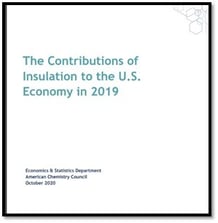 A newly released study of the insulation industry's economic contributions to the U.S. economy in 2019 details more than 564,000 jobs generated and $36 billion in payrolls that supported families and communities around the country. Those jobs in the manufacturing, distribution, and installation of insulation will be a critical component of the nation's continued economic recovery in the wake of the COVID-19 pandemic, according to the study's sponsor, the American Chemistry Council (ACC).
A newly released study of the insulation industry's economic contributions to the U.S. economy in 2019 details more than 564,000 jobs generated and $36 billion in payrolls that supported families and communities around the country. Those jobs in the manufacturing, distribution, and installation of insulation will be a critical component of the nation's continued economic recovery in the wake of the COVID-19 pandemic, according to the study's sponsor, the American Chemistry Council (ACC).
The report covers many common types of insulation, including fiberglass, cellulose spray foam, expanded and extruded polystyrene, mineral wool, and polyisocyanurate insulation used in residential, commercial, and industrial applications as well as in appliances, vehicles, equipment, and mechanical systems.
Insulation manufacturing is a $17.5 billion business and directly employs more than 39,000 people across 45 states. Indirectly, through its purchases of supplies, raw materials, equipment, and services, manufacturing supports an additional 56,400 jobs in supply-chain industries. Through the household spending of the wages and salaries paid to workers in insulation manufacturing and their suppliers, an additional 64,000 payroll-induced jobs are supported.
"The benefits stemming from the insulation industry extend far beyond monetary contributions," said Stephen Wieroniey, director of ACC's Center for the Polyurethanes Industry. "The use of insulation has valuable environmental benefits, as reduced energy consumption translates directly into lower emissions of greenhouse gases."
By lowering energy consumption and thus energy bills, insulation helps make businesses more competitive and gives households more spending power. The U.S. Environmental Protection Agency's (EPA) Energy Star program estimates that by adding insulation and sealing air leaks, the average household could save 15% on heating and cooling costs.[1]
The insulation industry is made up of businesses large and small, rooted in every community in America," said NAIMA President and CEO Curt Rich. "Our workforce takes pride in the fact that insulation is the most cost-effective step we can take to address the climate change challenge. We are particularly encouraged that the Biden climate plan identifies improving the efficiency of our homes and businesses as a priority."
To access the full report, follow this link.
[1] https://www.energystar.gov/campaign/seal_insulate/methodology





